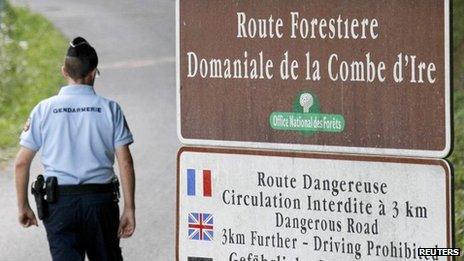France shootings: How can a child aged four handle trauma?
- Published

Police said four-year-old Zeena was found "terrorised, motionless, in the midst of bodies"
Zeena, the four-year-old daughter of a couple shot dead in a car in Annecy, was found by police eight hours after they arrived at the scene in Annecy, southern France.
She was concealed underneath her mother's body. She was physically unscathed, but the trauma of what she witnessed and the loss of her parents is likely to affect her for the rest of her life.
Zeena spent Wednesday night in hospital, with a nurse by her side all night.
'Shut down' response
According to Emma Citron, a consultant clinical psychologist who specialises in trauma in children, she would have experienced an acute stress reaction, which is a massive shock as a result of witnessing or being involved in a terrifying incident.
"It's a sort of shut-down response. It offers a degree of protection from having to deal with the the stimuli around you because you go into yourself and shut down," Ms Citron said.
"It allows the person some degree of coping in the most awful situations," she added.
Children of Zeena's age have a concept of life and death, Ms Citron said, but to a less developed extent compared with older children who would have a stronger grasp of the implications of parental death.
Police in Annecy said they spoke briefly to Zeena.
Annecy prosecutor Eric Maillaud said Zeena was found "terrorised, motionless, in the midst of the bodies".
Aware of the severity of the crime and the extent of the shock, police are likely to give Zeena some space, Ms Citron said.
The psychologist said they may take up to a week before trying to question the child.
While it is vital for police to get as much information as they can, and as quickly as possible, their technique in speaking with Zeena will have to ensure that she is not re-traumatised or faced with having to "re-live" the incident.
PTSD risk
"Psychotheraputically, it's better for [the child] to be amongst loved ones and have them nurtured and calmed, but of course the police have to have these vital clues and the police will be consulting with child psychologists on site," Ms Citron said.
There is a strong immediate psychological risk to Zeena of Post-Traumatic Stress Disorder (PTSD), and this could manifest itself in a number of ways, according to Ms Citron.
Recurrent flashbacks, reliving the incident in her mind like a film, sleeplessness and bed-wetting are among symptoms seen in children suffering from PTSD.
Ms Citron also said that, later in life, children who have witnessed violent events can also underachieve academically and feel they live in a "different sphere or world" from everyone else.
She may struggle in friendships and, Ms Citron said, traumatised children have tended to report later on that people do not understand them.
The loss of her parents, and the realisation of the significance of this as she grows older, will also complicate her trauma.
"It will take years and years of trained professionals helping her. She's at a very formative age where she's very dependent on her loved ones for her care and personality," she said, adding that having family members near to her will be crucial to her recovery and care.
"Even for a young baby, to go through such an awful thing traumatises them. With any developed concept of mortality, as they grow up, more and more, they realise all the loss as they piece it together," Ms Citron said.
Ultimately every child's experience of an atrocity is different, Ms Citron said, and very personal.
Zeena's ability to cope will depend on a number of factors, including her resilience and her genetic disposition.
"As she grows up it would be very much down to her own resilient personality, her genes, whether her family were or weren't copers - all of that has a part to play for how the future pans out for a child."
- Published4 November 2013
- Published6 September 2012
- Published6 September 2012